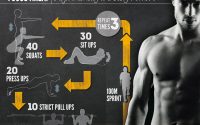Test Your Brain: Is It Time to Lose Weight?
Are you looking for some creative ways to challenge your mind? Well, there are a myriad of activities that can test your brain and keep it actively engaged, and one of these could be the question of whether or not it is time to lose weight. Weight loss isn’t easy, but it is a necessary step for a healthy lifestyle and well-being. If you are motivated to lose a few pounds, this article will help you understand what to do next. So, take this opportunity to test your brain and see how equipped you are to make the weight loss decision. Let’s get started.
1. Understand How Weight Connects to Your Brain
Our bodies and minds are interconnected and intertwined, and understanding how that connection works can help us live healthier, happier lives. Weight is no exception; our weight and our brain are equivalents when it comes to overall wellbeing. Here are the ways in which our weight and our brains are connected:
- Weight gain or loss can affect our brain chemistry.
- Weight can be a direct indicator of the stress level we’re carrying around.
- Certain imbalances in our innate biology are often to blame for difficulties in regulating our weight.
Weight problems can contribute to a vicious cycle of stress eating, further weight gain, difficulty finding solutions, stress eating again, and so on. Similarly, stress itself can result in a decrease in appetite and weight loss. Unintended changes in weight aren’t always earth-shattering, but if they happen too rapidly or aren’t part of a conscious lifestyle plan, it’s important to take stock of the situation and figure out the cause.
For many people, understanding the connection between their weight and their brain can lead to greater peace of mind and healthier lives.

2. Assess Your Cognitive Fitness
Do you ever feel like your mental capabilities are less than above-average? If so, you’re not alone. Many of us struggle to stay at the peak of our cognitive capabilities and alas, this doesn’t always happen. In order to assess your mental capabilities and determine your current cognitive fitness level, follow these steps:
- Keep Track of Your Routine: Take a moment to reflect on your daily routine. Are you able to focus regularly or are there frequent lapses in your attention? Are you struggling to keep up with your current workload? An honest analysis of your habits can give you first-hand insight into your cognitive fitness.
- Seek Professional Support: Not ready to take the self-assessment route? That’s totally fine. You can always opt for professional assessment that can provide more accurate insights. Seek out a psychologist to get a comprehensive assessment of your mental capabilities.
Understanding your cognitive fitness is the first step towards improving it. Once you identify any potential issues, you can work towards resolving them and regain a grasp on your mental capabilities.
3. Evaluate Your Emotional Connection to Food
When it comes to eating, how aware are you of how you feel emotionally? Do you take note of the situations, moments, and emotions that trigger unhealthy or unhealthy food cravings? To effectively transition to healthier dietary habits, it’s important to understand your emotional connection to food.
Below are some ideas to help you assess your emotional connection with food:
- Do an Emotional Check-In: Before turning to food to satisfy an emotional craving, take a moment for self-reflection. Ask yourself: What am I feeling? What is this emotion trying to tell me? When we can identify our emotions before reaching for something to eat, we can better respond to our needs.
- Name Your Eating Habits: Review your eating habits with an objective eye. Are you indulging in comfort food when you feel emotional? Do you over-eat when stressed or sad? Taking an inventory of your current behaviour helps you better understand the relationship between your emotions and unhealthy dietary habits.
- Tie Positive Emotions to Healthy Meals: Make a conscious effort to associate positive emotions with healthier food choices. Find an ingredient or meal that you enjoy, and make it a part of your nutrition plan. This helps to shift the focus of eating towards nourishing yourself with nutritious meals, rather than satisfying a craving.
By developing self-awareness about our emotional connection to food, we can better manage our cravings and embrace sustainable dietary habits.
4. Analyze Your Stress Levels & Diet
Analyze Your Stress Levels
It’s easy to get overwhelmed by the pressures of life. But understanding our stress levels is an important part of managing our mental and physical well-being. Keep a journal of the activities that are the most anxiety-inducing for you; whether it’s part of your job that’s overwhelming, interpersonal relationships in certain contexts, or other everyday occurrences. When you understand the areas where you feel the most stressed, you’ll be able to develop coping strategies that can help you reduce those stress levels.
Healthy Diet
Creating an awareness of what you’re eating every day is the first step to optimizing your overall health. Kale smoothies are nice and all but 500 calories of healthy smoothie won’t give you the same benefits as balanced meals. Make sure you’re getting the vitamins, minerals, and healthy fats your body needs to keep it at peak performance. And be mindful that snacks and sweets should be reserved for occasional treats rather than daily indulgences. Proper diet doesn’t just mean eating healthy, it means learning about nutrition and making educated decisions about the food you put into your body.
- Acknowledge the areas of life where you’re the most stressed
- Develop coping strategies for those stress levels
- Create awareness of your overall diet
- Balance meals with proper vitamins, minerals, and healthy fats
- Educate yourself on nutrition to make educated food decisions
5. Outline an Action Plan to Shed Pounds, Mentally & Physically
Create Reasonable Goals:
The most important part of forming an action plan to shed pounds mentally and physically, is setting long-term and short-term goals. Consider starting with basic, simple, achievable objectives that can be tracked and monitored easily. These goals should motivate and push you towards your ultimate end-goal. When creating goals, look for ones that are:
- Realistic
- Measurable
- Specific
Establish a Routine:
Create a reliable routine that can be followed and tweaked as goals are achieved. Make sure to factor in relaxation that may help with stress as well. Consider adding activities that could help shape your mental and physical health, such as:
- Exercise
- Regulated eating habits
- Meditation
- Journaling
It may be good to set and abide by a strict schedule in the beginning to end up forming habits. Setting general guidelines for yourself alongside achievable goals will help keep you motivated and on track.
Asked Questions
Q: What are the main benefits of losing weight?
A: Some of the main benefits of losing weight are improved mental and physical health, greater energy, improved self-esteem, and a lower risk for chronic illnesses like heart disease and diabetes.
Q: What challenges might I face as I try to lose weight?
A: Challenges associated with weight loss can include addressing unhealthy behaviors or patterns, lack of motivation, dealing with emotional eating, and navigating an environment of unhealthy food choices.
Q: What activities can help me lose weight?
A: To help achieve weight loss goals, activities such as incorporating regular exercise, tracking food intake, improving time-management and stress-reduction, adopting mindful eating habits, and creating dietary changes that are sustainable can all be beneficial.
Q: Are there any potential risks associated with losing weight?
A: Generally, the risks of weight loss are minor; however, potential risks can include physical injury related to exercise, dehydration or electrolyte imbalance from extreme dieting, and gallstones caused by rapid weight loss. It is important to understand these risks when planning for a weight loss journey.
Being healthy and keeping your brain sharp requires you to take care of your body. It is never too late to make a change, and making the change to lose weight is a great way to start. A healthy and balanced diet, combined with exercise, can work wonders for your mind and body. Take the steps to start your journey today, and watch your brain open up to a world of limitless possibilities.


